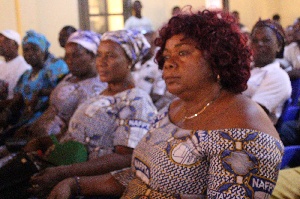- Home - News
- Elections 2024
- News Archive
- Crime & Punishment
- Politics
- Regional
- Editorial
- Health
- Ghanaians Abroad
- Tabloid
- Africa
- Religion
- Photo Archives
- Press Release
General News of Monday, 31 March 2025
Source: www.ghanawebbers.com
Stakeholders meet in Keta to address illegal fishing practices in Volta region
A stakeholders’ meeting on illegal, unreported, and unregulated (IUU) fishing took place at the Keta Municipal Assembly. Key players in the fisheries sector gathered to discuss concerns about illegal fishing methods and law enforcement.
The meeting included representatives from the Fisheries Commission, Marine Police, local government, and fisherfolk associations. They focused on harmful fishing techniques like light fishing, dynamite use, and the new "Mali Mali" method affecting Volta Lake.
Benjamin Campion from the Fisheries Commission condemned destructive fishing practices. He stated that "new ways of fishing are not necessarily legal." He highlighted light fishing as harmful because it makes fish easier to catch in large numbers. This leads to overfishing and depletion of fish stocks.
Campion also expressed concern about "Mali Mali," a new technique harming the environment. He noted that declining fish landings have pushed some fishermen to adopt illegal measures. These desperate actions threaten Ghana's fisheries sustainability.
"They are doing everything possible to increase their catch," he said. "But these methods are depleting the stock even further." The Fisheries Commission is collaborating with the Fisheries Enforcement Unit (FEU), which includes Navy personnel and Marine Police officers.
While FEU is crucial for enforcement, Campion admitted that naval patrols are costly. As a cost-effective alternative, the government plans to deploy Marine Police to coastal communities. They will also train regular police officers on fisheries-related offenses.
"The Marine Police know the law and can prosecute properly," he explained. More officers are needed along coastal districts and associated police stations.
The meeting followed a petition by the Concerned Fishers Association. This group of local fishermen urged authorities to take action against illegal fishing practices. The petition was sent through various channels before reaching the Fisheries Commission.
Local fishermen argued that if light fishing is banned, other illegal methods should be enforced too. In response, the Fisheries Commission clarified laws and educated stakeholders on upcoming enforcement measures.
Ruby Abu, president of NAFTA Municipality, spoke at the meeting about IUU fishing practices' health risks. She emphasized removing all illegal gear from the sector for public safety.
"We plead with our fishermen to stop using these methods," Abu stated. She explained that chemically treated fish harm health and affect market sales for traditional fishermen.
"When we send our fish to market, nobody buys because ours is too expensive," she said. Cheaper chemically treated fish dominate sales instead.
The stakeholders concluded with a commitment to collaborate on enforcement efforts. Fisherfolk leaders pledged community education on illegal fishing dangers while reaffirming cooperation with security agencies for stronger law enforcement.
They also discussed Landing Beach Committees overseeing premix fuel distribution. Campion noted minimal political influence in committee member selection but acknowledged potential delays due to involvement from local authorities.
With increased cooperation among fisherfolk and regulatory bodies, stakeholders hope Ghana’s marine and inland fish stocks can be preserved for future generations.











